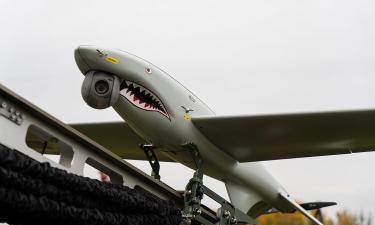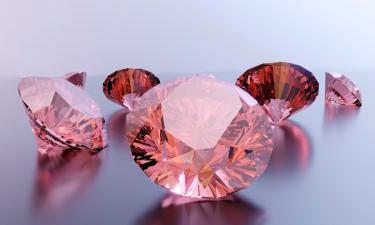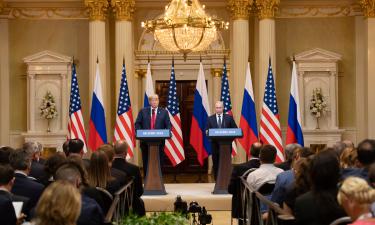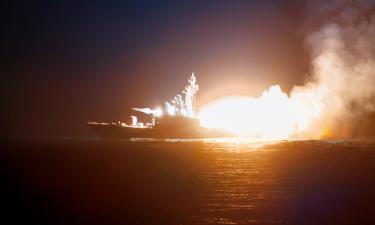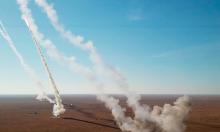Russia launches first female tourist in space
A Russian booster rocket carrying a new U.S.-Russian crew and the world's first female space tourist blasted off into space from the desolate steppes of Kazakhstan on Monday. The rocket headed to the International Space Station.
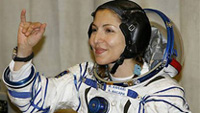
The Soyuz TMA-9 capsule blasted into space less than a day after the U.S. space shuttle Atlantis pulled away from the orbiting station and began its journey back to Earth. It entered orbit about 10 minutes after liftoff, according to Russian space officials monitoring the launch at Mission Control in Korolyov, outside Moscow.
"The launch was successful. Everything went as expected," said Russian Mission Control chief Vladimir Solovyov.
Click here to see the photoreport of the event
Russian cosmonaut Mikhail Tyurin and U.S. astronaut Michael Lopez-Alegria were to join German astronaut Thomas Reiter on the station just over 48 hours after blasting off from Baikonur. Traveling with the new crew was Anousheh Ansari, an Iranian-born American telecommunications entrepreneur who has paid a reported US$20 million (16 million euros) to become the fourth private astronaut to take a trip on a Russian spacecraft and visit the station.
"I'm just so happy to be here," she said ebulliently as she entered the rocket Monday, watched by about a dozen relatives, including her husband and mother, as well as the other crew members' families, space officials and reporters.
As the gantries fell away from the rocket and smoke started to billow below, Ansari's relatives gasped, their eyes and mouths widening. Her mother, Fakhri Shahidi, clasped her hands in front of her chest as if in prayer.
Tears streamed down Ansari's sister Atousa Raisyan's face when the rocket lifted into the air, while her aunt Chansi Brown began jumping up and down and shrieking with happiness, pumping her arms in the air. Ansari's husband, Hamdi, watched the liftoff stoically, then hugged Raisyan.
At Russian Mission Control, NASA flight director Robert Dempsey denied speculation that Ansari, being a nonprofessional, could in any way impede the mission.
"She will add to it. It will be a success," he said.
As to his own opinion about the propriety of sending tourists into space, he said: "My personal feeling is I wish it could be me."
Ansari, 40, was due to return to Earth on Sept. 29, along with cosmonaut Pavel Vinogradov and astronaut Jeffrey Williams, who have been on the station since April.
Speaking at a final news conference Sunday at the Russian cosmodrome in Baikonur, Ansari, 40, defended the role of "space flight participants" and said she viewed herself as an ambassador for attracting private investment to space flight.
Ansari gave $10 million in 2002 for the naming rights to a prize awarded to the first successful privately financed manned trip into space.
"In order to make great leaps in space exploration ... private companies and the government need to work together," she told reporters.
Ansari said she had worn a patch with the colors of the Iranian flag - along with a U.S. flag - on a jumpsuit during training in Moscow to make a "personal statement." In Iran, where she lived until she was a teenager, "people will see someone born in Iran flying into space," Ansari said.
Tyurin and Lopez-Alegria are to join Reiter as the construction at the space station is picking up pace. On the agenda for the four days following the departure of the Atlantis: The station's current crew will shift a Progress supply ship to a different docking port to make way for the Soyuz; Atlantis will land back on Earth; and the Soyuz will dock at the station.
During the six-month tenure of Tyurin and Lopez-Alegria, four space walks are planned, with as many as three to be conducted in January to help set up the station's permanent cooling system. Another will take place earlier to retrieve and install experiments on the station's exterior, the AP said.
"We are spending more time now doing science and research about the Earth's surface, and the increasing number of spacewalks are now devoted to developing the space station and installing new equipment - not to repairs as in the past," said Solovyov, the Russian Mission Control chief.
Subscribe to Pravda.Ru Telegram channel, Facebook, RSS!
